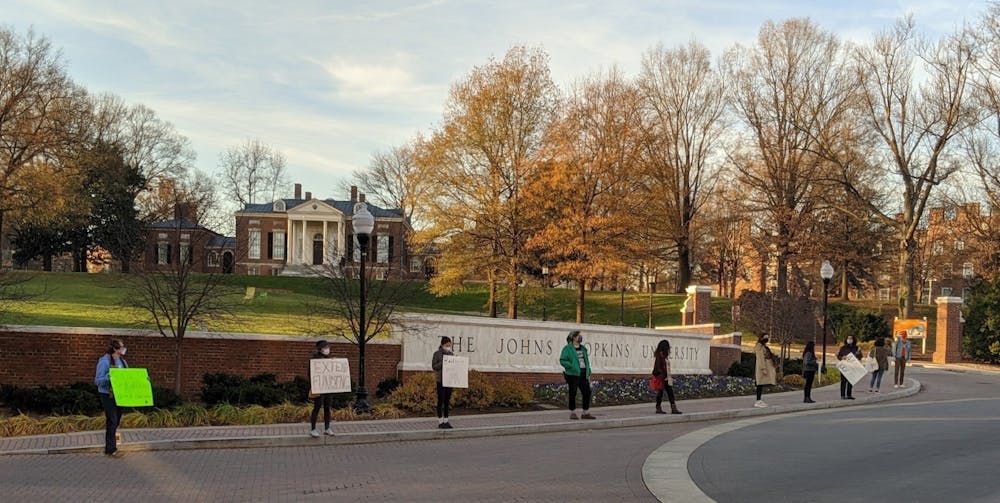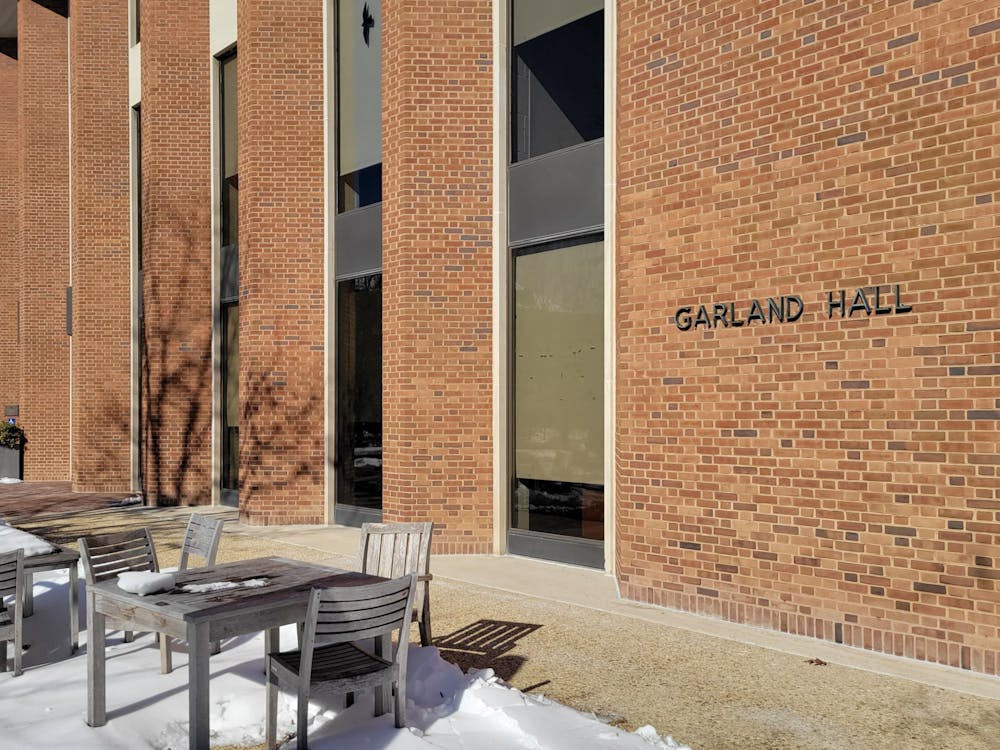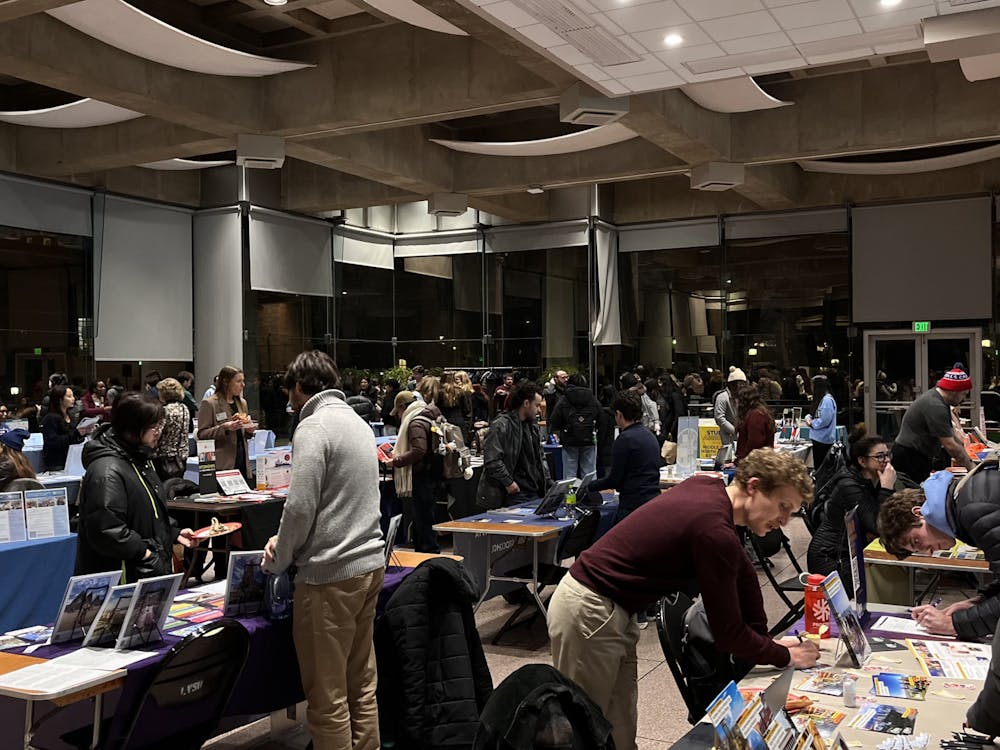Teachers and Researchers United (TRU), the University’s unofficial graduate student union, held a rally on Dec. 11 to demand that Hopkins improve its treatment of graduate students.
The rally, titled Uniting on Wheels, began with a car caravan through the streets surrounding Homewood Campus and ended at Homewood’s East Gate. About 30 protesters listened to several graduate students, including Caleb Andrews read student testimonials criticizing the University.
TRU outlined four demands during the rally: a universal one-year funding extension for all PhD students; free access to the COVID-19 vaccine once it becomes available, along with proper personal protective equipment, masks and sanitizers; decision-making power in laboratory and classroom safety, especially if the University reopens for the spring semester; and official recognition as a union by Hopkins.
Andrews, a third-year student in the Materials Science and Engineering Department and liaison for TRU, transferred to Hopkins shortly before the University moved online in March. He argued that Hopkins prioritizes its productivity over the safety and security of its graduate students.
Andrews read an anonymous testimonial by a student citing unsafe lab conditions. The student noted that cleaning protocol violations were unaddressed by their faculty advisor. Their lab also filed a plan with workplace densities three times above the University threshold. Other anonymous testimonials are posted on TRU’s Facebook page.
First-year PhD student Alexander Peeples, a member of the TRU Organizing Committee, explained in an interview with The News-Letter that the union felt it had no choice but to take to the streets. The rally came months after TRU circulated a petition condemning the University’s regulations regarding student conduct throughout the pandemic.
“We were at one point directly negotiating with the University, and they unilaterally pulled out,” he said. “In effect, because the University has chosen not to listen to us at any other venue, we have chosen to take it to this point of having a car caravan and a rally.”
TRU harshly criticized Hopkins for its austerity measures. The University adopted several tactics in an effort to keep from losing over $100 million during the 2020 fiscal year, including hiring freezes and layoffs. The University expected a loss of $73 million due to the pandemic, citing the austerity measures as a way to keep the deficit from increasing.
However, TRU noted that the University ultimately reported a $75 million surplus during the 2020 fiscal year. Andrews questioned why the University is not using more of its $970 million unrestricted emergency reserves to support students.
“Providing one year of health care, tuition remissions and full stipends for all PhD students through the length of this crisis would cost no more than $41 million,” he said. “Comprehensive COVID relief for us would require accessing no more than 4.3% of that reserve.”
Many graduate students have reported a loss of funding due to the pandemic. Student groups, including the Graduate Representative Organization, Graduate Student Association and TRU, united to petition the University for a one-year extension of funding for all PhD students in March.
In response, Nancy Kass, vice provost for graduate and professional education, affirmed the University’s mission in an email to The News-Letter to support graduate students financially by having departments work directly with their students.
“These are handled on a case-by-case basis; granted requests may come in the form of waived tuition or fees, the extension of a stipend, additional teaching and/or fellowship opportunities, payment of student health plan premiums for additional semesters of enrollment or additional short-term funds,” she wrote.
However, many graduate students were unsatisfied with the financial aid. The University only granted select students small amounts of money and directed others to apply to the emergency relief fund, which was not sufficient to aid the majority.
TRU members Alex Parry and Kristin Brig-Ortiz, both fourth-year History of Medicine PhD students, stressed that different departments do not have the same financial means in an email to The News-Letter.
“Some departments have provided relief to at least some of their graduate students, but this support remains inconsistent across the university and has deepened the inequalities between well-funded and underfunded programs,“ they wrote.
Kass also explained that the University established the COVID-19 Caregiving Relief Fund in September to grant financial assistance to employees and doctoral students who have incurred losses, including caregiving, educational and technological expenses, as a result of the pandemic.
However, TRU testimonials suggested that these efforts are not enough.
A Political Science graduate student and member of the TRU Organizing Committee, read a statement by Celia Litovsky, a sixth-year PhD student in the Cognitive Science Department. The pandemic affected both her mental health and access to campus resources, slowing down her research as a result. She was concerned that she would not receive more than her guaranteed five years of funding to complete her degree.
“In my efforts to secure funding for the semester, I had to write a letter to the [Krieger School of Arts & Sciences] dean, in which I detailed very personal mental health issues and expressed why my research has slowed down due to COVID,” they read. “Not only did I never hear back from the administration about this request, but I should never have had to reveal such personal information to the University.”
Litovsky wound up moving out of state due to financial concerns. She urged the University to support its community, noting that the world has looked to Hopkins as a model since the start of the pandemic.
Kass expressed her gratitude for the work and many responsibilities that graduate students have accomplished.
“We appreciate the many challenges our graduate students are currently facing through this period as they juggle their research, academic, and teaching responsibilities with being temporarily displaced from their usual work/study locations, navigating the shift to virtual activities and pausing essential field work and internships, and also, for many, balancing additional caregiving duties due to the pandemic,” she wrote.
Despite this statement of support, TRU feels that graduate students are not receiving enough from the University.
“We’ve been essential to operating in the University in the midst of this pandemic, and we are simply asking that Hopkins treat us like human beings and provides us with what we need to do our jobs safely,” Andrews said.
A graduate student also spoke about a Black female graduate student who started a GoFundMe campaign to raise money for rent, food and bills. According to her campaign page, she was academically dismissed from “a leading School of Public Health” after reporting her advisor for sexual harassment. JHToo, a group consisting of Hopkins community members who organize against sexual misconduct, also began circulating a petition to garner funds for the student. The student has a part-time job, but it does not cover her monthly expenses.
Peeples encouraged the protesters to donate.
“Students continue to be in precarious situations. Students have faced backlash and lost funding and been put in deadly situations because of COVID during the current conditions the University is enforcing. It’s obviously not enough — for students now, for the students in years to come,” he said. “We demand more because Hopkins can afford it.”
Michelle Limpe contributed reporting to this article.





